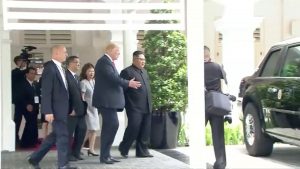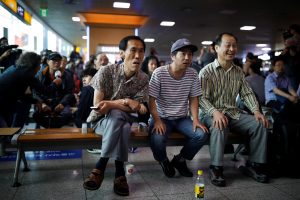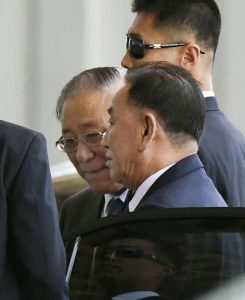
By Cynthia Kim and Hayoung Choi
SEOUL (Reuters) – North Korea’s economy contracted at the sharpest rate in two decades in 2017, South Korea’s central bank estimated on Friday, as international sanctions and drought hit growth hard, with signs living conditions were beginning to deteriorate.
Gross domestic product (GDP) in North Korea last year shrank 3.5 percent from the previous year, marking the biggest decline since a 6.5 percent drop in 1997 when the isolated nation was hit by a devastating famine, the Bank of Korea said.
North Korea does not publish economic data, and comprehensive public figures on social conditions are nonexistent.
However, analysts believe wider sanctions last year are likely to make the economic deterioration in 2018 worse than 2017, which could add to humanitarian need in the politically isolated state.
“The sanctions were stronger in 2017 than they were in 2016,” Shin Seung-cheol, head of the BOK’s National Accounts Coordination Team said.
“External trade volume fell significantly with the exports ban on coal, steel, fisheries and textile products. It’s difficult to put exact numbers on those but (export bans) crashed industrial production,” Shin said.
Both Seoul and Washington argue that increasingly strict international sanctions imposed over North Korea’s nuclear weapon and ballistic missile program have been instrumental in leader Kim Jong Un’s decision to impose a ban on weapons testing and to negotiate with international leaders.
North Korea has called the sanctions “vicious” but rejects suggestions that the pressure led them to pursue diplomatic talks.
The situation also worsened last year with international experts fearing North Korea was facing the worst drought in 16 years, though late summer rains helped avoid acute food shortages.
North Korean leader Kim Jong Un in April vowed to switch the country’s strategic focus from the development of its nuclear arsenal jump starting his economy, but analysts say that will be difficult while sanctions remain in place.
“As long as exports of minerals are part of the sanctions, by far the most profitable item of its exports, Pyongyang will have no choice but to continue with its current negotiations with the U.S.,” said Kim Byeong-yeon, an economics professor at the Seoul National University who specializes in the North Korean economy.
U.S. President Donald Trump has said that sanctions won’t be lifted until Kim moves to give up his nuclear and missile arsenal.
INDUSTRY TAKES A HIT
North Korea’s coal-intensive industries and manufacturing sectors have suffered as the UN Security Council ratcheted up the sanctions in response to years of nuclear tests by Pyongyang.
Industrial production, which accounts for about a third of the nation’s total output, fell 8.5 percent. That marked the steepest decline since 1997 as factory production collapsed on restrictions of flows of oil and other energy resources into the country. Output from agriculture, construction industries fell by 1.3 percent and 4.4 percent, respectively.
China, its biggest trading partner, suspended coal purchases last year which cut North Korea’s main export revenue source while its suspended fuel sales into to country sparked a surge in gasoline and diesel prices, data reviewed by Reuters showed earlier.
Since then, however, fuel prices have stabilized and even dropped in recent weeks, according to a report published last week on the North Korean Economy Watch website.
“My best guess is that it’s a combination of increased smuggling, perhaps aided by China’s declining vigilance in enforcing sanctions and restrictions against illicit trade across the border,” analyst Benjamin Katzeff Silberstein wrote in the report.
North Korea’s black market, or Jangmadang, has grown to account for about 60 percent of the economy, according to the Institute for Korean Integration of Society.
“Shrinking trade first hits the Kim regime and top officials, and then later affects unofficial markets,” said Kim at Seoul National University, noting the squeeze would also be felt in household income and private consumption.
China’s total trade with North Korea dropped 59.2 percent in the first half of 2018 from a year earlier, China’s customs data showed last week.
The BOK uses figures compiled by the government and spy agencies to make its economic estimates. The bank’s survey includes monitoring of the size of rice paddy crops in border areas, traffic surveillance, and interviews with defectors.
HUMAN TOLL
Prices for food staples like rice and corn have remained stable under changing sanctions, and there are signs that a growing number of North Koreans have access to electronic appliances, often powered by solar panels, according to data gathered by the DailyNK website.
North Korean defectors in the South, however, say they hear reports of increased suffering.
“The economic status in Hamgyong area was very bad, according to my sources within North Korea,” said Kim Seung-cheol, a defector who heads the NK Reform Radio station in Seoul, referencing an area near the border with China.
“In South Hamgyong, some people died of hunger. Since trade with China fell significantly, foreign traders in the border area are suffering from poverty.”
The United Nations’ top aid official visited the country last week and said there was “clear evidence of humanitarian need.”
Other U.N. officials warn that aid groups face difficulties accessing international banking channels, transporting goods into the North Korea, while rising fuel prices hinder aid delivery.
North Korea’s Gross National Income per capita stands at 1.46 million won ($1,283.52), making it about 4.4 percent the size of South Korea’s, the BOK said.
Overall exports from North Korea dropped 37.2 percent in 2017, marking the biggest fall since a 38.5 percent decline in 1998, the BOK said on Friday, citing data from the Korea Trade-Investment Promotion Agency.
($1 = 1,137.5000 won)
(Additional reporting by Cynthia Kim,; Editing by Sam Holmes)











